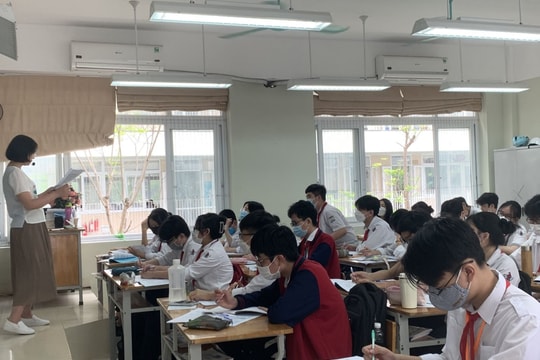No ceiling on university tuition fees, poor children choose to study "hot" majors?
When the average income of society is still low and the student credit fund system has not been completed, the lack of a tuition ceiling for public universities makes it difficult for poor students to study attractive majors such as medicine, economics, banking, etc.
This is one of the concerns raised by the Committee on Culture, Education, Youth, Adolescents and Children for National Assembly deputies to discuss at the conference of specialized National Assembly deputies held on the morning of September 7. The Law amending and supplementing a number of articles of the Law on Higher Education was discussed at the 5th session and is expected to be passed at the 6th session of the National Assembly (October 2018).
 |
| Medicine and pharmacy are highly attractive fields of study, and many people are concerned that if tuition fees are not controlled, poor students will have little opportunity to study. Illustrative photo |
Regulations on finance and assets are one of the major contents in the report on explanation, reception and revision of the draft law serving the conference of the National Assembly's Committee on Culture, Education, Youth, Adolescents and Children.
During the discussion at the parliament, some opinions suggested clearly defining the State's responsibility in investing in higher education. Changing the investment method, having a mechanism to encourage the diversification of revenue sources, specifying and requiring publicity and transparency on training costs, tuition fees and support policies for learners, ensuring fairness and equality between the public and private sectors. Some people said that it is necessary to be cautious in legalizing the mechanism of financial autonomy for public universities...
In response to delegates' opinions, regulations on investment in higher education were revised and supplemented in the direction of confirming the State's responsibility in investing in the development of higher education. Regulations on budget allocation methods through the following forms: investment expenditure, research and development expenditure, research orders, training, scholarships, student loans according to the principles of competition, equality, and efficiency.
Full tuition for college, no ceiling
Regarding tuition fees and other service fees, the draft law is revised to maintain the regulation that tuition fees are the amount that students must pay to higher education institutions to cover part or all of the training costs. The tuition fee is determined on the principle of calculating full costs based on the unit costs publicly disclosed by higher education institutions without determining a tuition fee ceiling. At the same time, the regulation that tuition fees are a revenue of higher education institutions is independent of the funding source provided by the state budget.
The agency reviewing the draft law said that during the discussion, there were many concerns that when the average social income is still low, the student credit fund system (both public and private) and the mechanism for establishing a financial fund to support scholarships and school development have not been completed, then not regulating a tuition fee ceiling for public universities may make it difficult for a group of learners to access higher education, especially in some highly attractive fields (such as medicine, economics, finance, banking, etc.).
On the contrary, many other opinions also believe that, in the autonomous mechanism, it is necessary for schools to balance and determine the tuition fee level at a level that is acceptable to society/students and commensurate with the quality of training services. Schools should consider this themselves to create competition and improve the quality of attracting students. Moreover, the mechanism for collecting and using tuition fees for public educational institutions will also be specifically regulated in sub-law documents (it is expected that the Government will regulate in detail according to the provisions of the Law on Education).
Without expressing an opinion, the standing committee of the review agency brought the issue to ask for the opinions of the delegates.
Regarding financial management, according to the draft law, for public higher education institutions that self-insure all regular operating expenses, with a resolution approved by the University Council, they can decide to invest in projects using legal revenue sources outside the state budget of the higher education institution to carry out training activities, scientific research, and technology transfer; they can autonomously decide on the content and level of expenditure from tuition and career revenue sources, funding sources for ordering and assigning tasks, including salary expenses, professional activity expenses, management expenses, and are stipulated in the financial regulations of the higher education institution. Higher education institutions must conduct audits and publicize financial sources.
Regarding the management and use of assets, the draft law stipulates that assets such as land, budget and assets invested by the State for higher education are managed according to the provisions of the law on financial management and public assets. Schools are allowed to use a part of the assigned assets for business, leasing, and association for the purpose of developing higher education according to the principles of preservation and development.



